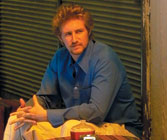FAST TRACK V.2
In its second year, the IFP/Los Angeles Film Festival and Filmmaker’s Fast Track program returns to support 10 festival alumni embarking on new features. Tamara Krinsky checks in with the filmmakers.
| |||||
| |||||
| 2004 Fast Track participants. TOP (left to right): Michaline Babich;
Martin Garner; Mora Stephens; Dana Jackson; Jessica Sanders. BOTTOM (left to right): Paxton Winters; Dane Smith; Anna Kang; Tom Putnam. Not pictured: Deborah Kampmeier. |
The 2004 Fast Track Program has hit the ground running, with an expanded slate of projects and new rules for participation. The program began last year as a joint project of the IFP/Los Angeles Film Festival and Filmmaker, and provides resources and exposure to alumni of the festival in order to help further their next projects.
This year, Fast Track upped the number of projects from three to 10 and opened up the submission process to participants in the IFP/LA Screenwriters, Directors and Producers Labs. Said festival director Rich Raddon, “I love that we continued the program and included lab participants. Often we lost touch after a filmmaker has gone through a lab or the festival, and this program allows us to reconnect and use the infrastructure of the festival to their advantage.”
Josh Welsh, lab administrator, explained that all previous lab participants and 2002 and 2003 festival alumni were invited to submit. Fast Track received a wealth of strong projects, and ultimately, professionalism became an important criterion for acceptance. “It wasn’t just about a good script,” said Welsh. “We wanted articulate people who are really trying to make their films.”
Writer-director Anna Kang certainly falls into this category. She’s ready to make her feature debut with The Lost Tribe of Long Island, the satirical story of a 12-year-old Korean Catholic girl who just wants to be Jewish, set in the mid-1980s. Kang went through the Sundance Institute Screenwriters Lab with an early version of the script and developed it further in the IFP Screenwriters and Directors Labs. Joked Kang, “I can’t possibly rewrite the script another time!”
|
Kang’s infectious belief in the script is absolute. “Read the script. If it’s something you believe in making, let’s do it! The film is really about alienation and wanting to be loved. You don’t see Asian people telling this story via a comedic lens very often. So the right people will read it, say ‘I have to do this!’ and take a chance on a first-time director.”
Writer-director Martin Garner has a similar attitude about his absurdist dramatic comedy Shinola. Set entirely in his hometown in Missouri, the film tells the story of small-town construction worker Dwayne Burball, who decides to get his life together after a near-fatal encounter with a pneumatic nail gun and a subsequent deathbed vision involving Kenny Rogers.
Garner participated in both the Screenwriters and Directors Labs, and Dickson/Arbusto will be casting the film. Right now his focus is on finding a creative producer to chase financing.
Although Garner has other writing credits, including the Sundance feature Trans, he feels strongly about making Shinola his directing debut. “No one knows this material better than me, and the actors in the readings we did (John Hawkes, Donal Logue, Nick Offerman) responded to my confidence.”
Director Tom Putnam puts forth his own darkly comedic vision in Where the Hell Is Bill?, which he co-wrote with Jeff Malmberg and Michael Harbour, who will also produce. The film is about a 22-year-old man who accidentally kills all of his friends in a car accident and has to move back in with his parents. “It’s about that moment in life when you first get out of college and you have all these ideas about your life,” said Putnam. “And then things don’t go that way.”
When he and his partners first finished the script, they got a lot of responses about the “weird mix” of comedy and drama it contained. “Everyone wanted to classify it, which is difficult,” said Putnam, “so it made it harder to sell.” The three writers decided to make a short in the style of the feature to demonstrate what they were going for; Tom Hits His Head has now played at over 100 festivals, including the 2003 LAFF.
Actor Colin Hanks is currently attached to play Bill, Matthew Rhodes (Auggie Rose, September Tapes) has come aboard as an additional producer, Monika Mikkelson (Serving Sara) is casting, and Alex Vendler (Kurt & Courtney, Melvin Goes to Dinner) will shoot the film. What the project really needs now is a production company partner with a lot of experience producing films in the $5-million to $10-million range.
Two projects chosen for Fast Track are being spearheaded by producers. Interestingly, both were written for significantly smaller budgets, with the hopes that the lower costs would help propel the projects toward completion. Dane Smith is shepherding writer-director Eric Allen’s Bondage, and Dana Jackson has partnered with writer-director Kurt Voelker on Park.
Park takes place all in one day in a public park in Los Angeles, as 11 disaffected Angelenos find both love and loss in unexpected ways. Said Voelker, who counts Sweet November among his studio writing credits, “The Swiss watch of intersecting storylines looks at the folly, tragedy, loneliness and ridiculousness of humanity — specifically that which you find in Los Angeles. I wrote it both because I knew we could do it inexpensively and because it’s the kind of acting I love to see — purely character driven.”
Currently they need a casting director and line producer with good low-budget L.A. credentials. At this point they’ve gone out to a very limited number of financiers. “We’re ready to go kamikaze to get this made,” said Jackson, who has over a decade of experience in development. “We have the vision and passion for guerrilla filmmaking. It would be great to have an angel to walk us through the production financing.”
Producer Dane Smith was at the 2003 LAFF with the short film The Freak, which just hit its 100th festival and has since been optioned by Mandalay Pictures to be made into a feature, which Smith will produce. Eric Allen, who makes his living as a screenwriter, met Smith at last year’s festival, and the producer soon became one of his trusted readers.
“When Josh contacted me about submitting something to Fast Track,” said Smith, “Bondage was the first project I thought of. It’s a true low-budget indie film.” Based on a true story from when Allen was 16, the film is about a teenager who pretends to be insane when he gets in trouble with the law.
Smith and Allen would like to take advantage of Smith’s Canadian citizenship and shoot north of the border. They are currently on the hunt for a line producer to do a Canadian budget on spec.
Director Paxton Winters, who won the IFP Target Filmmaking Award at the 2003 LAFF for his film Crude, also hopes to shoot his project outside of U.S. borders. Iraqi Freedom, which he co-wrote with Emre Mirza, is about an American soldier in Iraq and the relationship he forms with an Iraqi family. “It’s not a preachy, didactic war movie,” said Winters. “It’s about a personal journey, with the soldier exploring the two cultures, who he is and who his country is vis-à-vis the rest of the world.”
Winters splits his time between New York City and Istanbul, which is where he met his Afghani/Pakistani co-writer, Mirza. The script went through the Sundance Screenwriters Lab this year; Winters then workshopped it extensively with an acting coach and her students in New York.
Phyllis Freed Kaufman (executive producer, Crude) is on board to produce the film, and they are now looking for a casting director. Other needs include production designers and a d.p. with a sensitivity to the subject matter and experience working in countries that resemble Iraq, such as Morocco and Tunisia, or possibly even the southwestern United States.
Writer-directors Mora Stephens and Deborah Kampmeier have both set their female-oriented films in the American South. Stephens’s Georgia Heat, co-written with Sharri Hefner, tells the story of a 1968 Korean G.I. wife living in Georgia who learns that the son she left behind in Korea is coming to visit her. Kampmeier’s Hounddog is about a nine-year-old girl in the rural South who combats a cycle of abuse through singing.
Both filmmakers feel strongly about shooting on 35mm as opposed to digitally due to the southern locations. “The landscape itself becomes a character,” said Kampmeier, “and it needs to be lush and vital. There’s a mythological element — it’s a southern story.” Stephens felt similarly, explaining that the color and texture of the landscape were important for her period piece.
Stephens has directed numerous short films and plays, and went through the IFP Directors Lab and the Tribeca Film Festival All Access program with Georgia Heat. Current elements in place include producers Paul Yi and Joel Viertel, lead actress Kim Yoon-jin (Swiri) and casting director Felicia Fasano. Her next steps involve finding the right male leads to work with Kim, and a production co-financier who is passionate about the film.
“I had imagined a Korean southern accent without ever hearing one,” said Stephens. “When we went down to Georgia to do research, we discovered it’s this beautiful, musical way of talking. I’m so excited and passionate about the project — hopefully it’s contagious.”
Hounddog, Kampmeier’s passion project, was set up four times, and each time financing fell through. Frustrated, in 2002 she decided instead to shoot Virgin, an ultra-low-budget film which went on to premiere at the 2003 LAFF and was subsequently nominated for two 2003 Independent Spirit Awards.
She brought Hounddog to Fast Track because “it’s always been in the forefront of my imagination, and it’s what I’m most passionate about right now.”
Kampmeier hopes to shoot in October 2004. In place are her crew, locations and the majority of her cast, including Robin Wright Penn, Lynn Redgrave, David Morse and Delroy Lindo. They are still searching for the little girl to play the lead in the film, as well as financing. “After 10 years of putting the pieces together,” said Kampmeier with a laugh, “I’ve got everything but the money.”
Just as the IFP labs have recently begun to include documentarians, this year Fast Track has done so as well. Writer-director-producer Jessica Sanders is in the final stage of shooting After Innocence, which looks at “the exonerated,” people who have been wrongfully convicted of crimes and freed by DNA evidence after spending decades in prison. The project was part of the 2003 IFP/LA Producers Lab.
The film has one more segment left to shoot in Florida, and could use a 10-15 day donation of Sony DSR-500 cameras. Once production is wrapped, Yana Gorskaya (Spellbound, Seeds) will begin editing. Any donations in the postproduction services area would be greatly appreciated, as the filmmakers have been fund-raising the entire time they have been shooting.
“Over 150 people have been exonerated by DNA evidence,” said Sanders. “They get no apology from the state, and most don’t get any money. This film can really help them, and I hope people will respond to that. It can really make a difference in our legal system.” Because of this, Sanders would love to have a mentor who could help guide her through the process of theatrical distribution and getting the doc out to the widest audience possible.
Director-producer Michaline Babich, who has had two projects at the LAFF (2002’s The Big O and 2003’s Kiss and Tell), has been shooting Greetings from Cemetery Road for the last 10 years. This personal documentary follows her uncle, 70-year-old Pennsylvania native Nick Babich, who makes his last stand against a hazardous waste site that has been poisoning his town outside Pittsburgh for the last 30 years. Babich has one last section of Cemetery to shoot before diving into the 100-plus hours of footage she’s already amassed, and needs to find camera operators in either western Pennsylvania or eastern Ohio. Once she’s finished, she’ll need an editor, as well as an associate producer who has had experience working in postproduction with loggers and story departments and can be a true creative force on the project.
Babich would love to use Fast Track to find a mentor who has worked with PBS and is familiar with navigating the waters of documentary distribution. She’s also in search of either a group or an individual who can bring media attention to this story of a town fighting against a dump with a lot of money behind it. “The film needs its own Erin Brockovich,” said Babich. “Or — as my 70-year-old uncle calls her — Sharon Brockovich.”
VOD CALENDAR


 See the VOD Calendar →
See the VOD Calendar →











